Authentic Borneo Orangutan Trip
Itinerary
-
Day 1 Arrive in Pangkalan Bun Kalimantan
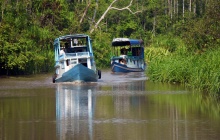 Today, you arrive at the airport of Pangkalan Bun in Kalimantan. Your driver will pick you up at the airport and transfer to your hotel for getting a rest before your boat trip in Tanjung Puting National park for next days.
Today, you arrive at the airport of Pangkalan Bun in Kalimantan. Your driver will pick you up at the airport and transfer to your hotel for getting a rest before your boat trip in Tanjung Puting National park for next days.
- 30 drive
- Night in BRITS HOTEL PANGKALAN BUN: deluxe room
- No Meals -
Day 2 PANGKALAN BUN – KUMAI – TANJUNG HARAPAN
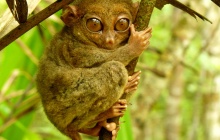 Your guide will be waiting for you at your hotel, transfer to the port of Kumai about 15-20 minutes by car where we will embark on a great adventure! You arrive at our traditional wooden boat, called a klotok. Our guide will reconfirm with the crew that everything is ready and start the cruise up the river in the famous Sekonyer River aboard a klotok. If your flight arrives early (before 11.30 AM), you can arrive in time to the rehabilitation center of Tanjung Harapan, where at 3 o’clock in the afternoon, the rangers of the national park feed the orangutans, and you can have your first close encounters with them. The translation of Tanjung Harapan is Cape of Hope. This first camp is one of the ones with more wetlands, and being in the afternoon has more mosquitoes, so make sure you put on enough mosquito repellent. Here you also can do the reforestation, where you can be volunteers to plant a tree, and so take pride that you have contributed a grain of sand to conservation with your step over there. After visiting this Rangers Camp, you will continue upstream, resting on the boat, while you search for animals in the vicinity of the Sekonyer River. This afternoon, it is very frequent to see groups of proboscis monkeys and monkeys in the treetops, jumping from one branch to another, or even crocodiles, and lizards in the shallow waters of the sides of the river. Prepare for sunset. The boat moored on one side of the river to spend the night. Tonight, you can do a walk into the jungle to look for night animals like snakes, tarantulas or if you are lucky luminescent mushrooms or tarsiers.
Your guide will be waiting for you at your hotel, transfer to the port of Kumai about 15-20 minutes by car where we will embark on a great adventure! You arrive at our traditional wooden boat, called a klotok. Our guide will reconfirm with the crew that everything is ready and start the cruise up the river in the famous Sekonyer River aboard a klotok. If your flight arrives early (before 11.30 AM), you can arrive in time to the rehabilitation center of Tanjung Harapan, where at 3 o’clock in the afternoon, the rangers of the national park feed the orangutans, and you can have your first close encounters with them. The translation of Tanjung Harapan is Cape of Hope. This first camp is one of the ones with more wetlands, and being in the afternoon has more mosquitoes, so make sure you put on enough mosquito repellent. Here you also can do the reforestation, where you can be volunteers to plant a tree, and so take pride that you have contributed a grain of sand to conservation with your step over there. After visiting this Rangers Camp, you will continue upstream, resting on the boat, while you search for animals in the vicinity of the Sekonyer River. This afternoon, it is very frequent to see groups of proboscis monkeys and monkeys in the treetops, jumping from one branch to another, or even crocodiles, and lizards in the shallow waters of the sides of the river. Prepare for sunset. The boat moored on one side of the river to spend the night. Tonight, you can do a walk into the jungle to look for night animals like snakes, tarantulas or if you are lucky luminescent mushrooms or tarsiers.
- 20m drive
- Night on Klotok Boat
- Meals: B, L, D -
Day 3 TANJUNG HARAPAN VILLAGE – PROBOSCIS TOUR – CAMP LEAKEY
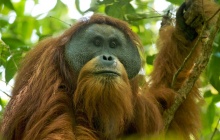 After an extraordinary breakfast, you go to visit the village inside the national park, named Tanjung Harapan Village. Here you will see the activities of the locals. After the visit, you will return to the klotok cruise up to the Seikonyer River. You will see nice vegetation around the river bank, including Nipa Palm, Pandanus, and some kinds of trees that are growing up around the river. See some wildlifes such as birds, Macaques, Proboscis Monkeys and Orangutans. You will see how the coloration of the river changes, and you will have the opportunity to see crocodiles and large monitor lizards.
After an extraordinary breakfast, you go to visit the village inside the national park, named Tanjung Harapan Village. Here you will see the activities of the locals. After the visit, you will return to the klotok cruise up to the Seikonyer River. You will see nice vegetation around the river bank, including Nipa Palm, Pandanus, and some kinds of trees that are growing up around the river. See some wildlifes such as birds, Macaques, Proboscis Monkeys and Orangutans. You will see how the coloration of the river changes, and you will have the opportunity to see crocodiles and large monitor lizards.
Arrival at Camp Leakey, the old orangutan research and rehabilitation center since 1971, when a student at UCLA Los Angeles University, Birutte Galdikas began studying the Orangutans there. The name Camp Leaky comes from Birutte’s own teacher, the Paleoanthropologist Louis Leakey. At least 200 orangutans had already been cured and returned to the jungles, thanks to this center. However, since 1995, the Government of Indonesia has banned the introduction of more Orangutans into this camp, so Orangutans are increasingly adapting more to freedom. To this day, this camp is used as an investigation into the behavior and feeding of Orangutans. You will take advantage of your guide to explore the interiors of the jungle a bit to look for orangutans in freedom and other animals. At 14.00, you can see the feeding time of the Orangutans. You can also visit the small museum made by the scientist Dr. Birute Galdikas.
Note: The Birate Galdikas Museum at Camp Leaky is currently closed for maintenance purposes. Regrettably, visits to this site will not be possible until further notice. We apologize for any inconvenience this may cause and will keep you updated on the reopening of the museum.- Night on Klotok Boat
- Meals: B, L, D -
Day 4 PONDOK TANGGUI – CAMP LEAKEY – BOAT
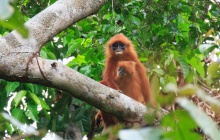 After an extraordinary breakfast, you will go in time to see the Pondok Tanggui Camp at the time of feeding (9 AM). Sooner or later, you will see how the branches of the treetops begin to move, and then you will see the silhouettes of the Orangutans arriving at the feeding platform. Pondok Tanggui was a release camp for young Orangutans that were rehabilitated, and they continue to add food every day to prevent the Orangutans from leaving because of a lack of food. They end up outside the National Park, with the following risk of falling into traps of settlers or fields of palm oil plantations. After lunch, you will have the opportunity to repeat feeding camp at Camp Leaky. It is a unique opportunity to dedicate more time to your observation and to discover more wild animals, along with the Orangutans. In the afternoon, if it does not rain, the boat will be docked near a firefly congregation, and you can enjoy the show of its luminescence.
After an extraordinary breakfast, you will go in time to see the Pondok Tanggui Camp at the time of feeding (9 AM). Sooner or later, you will see how the branches of the treetops begin to move, and then you will see the silhouettes of the Orangutans arriving at the feeding platform. Pondok Tanggui was a release camp for young Orangutans that were rehabilitated, and they continue to add food every day to prevent the Orangutans from leaving because of a lack of food. They end up outside the National Park, with the following risk of falling into traps of settlers or fields of palm oil plantations. After lunch, you will have the opportunity to repeat feeding camp at Camp Leaky. It is a unique opportunity to dedicate more time to your observation and to discover more wild animals, along with the Orangutans. In the afternoon, if it does not rain, the boat will be docked near a firefly congregation, and you can enjoy the show of its luminescence.
- Night on Klotok Boat
- Meals: B, L, D -
Day 5 KUMAI PORT – PANGKALAN BUN
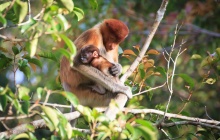 In the early morning you will enjoy the last moments of the sounds of the jungle before heading to the port to, in turn, to be transferred to the hotel in Pangkalan Bun.
In the early morning you will enjoy the last moments of the sounds of the jungle before heading to the port to, in turn, to be transferred to the hotel in Pangkalan Bun.
Enjoy and relax at your hotel on your own leisure.- 20m drive
- Night in BRITS HOTEL PANGKALAN BUN: deluxe room
- Meals: B -
Day 6 Farewell Tanjung Puting Park - End of your trip
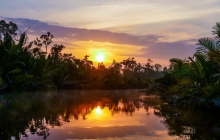 Free time in PANGKALAN BUN before the driver take you to the airport according to your flight schedule.
Free time in PANGKALAN BUN before the driver take you to the airport according to your flight schedule.
- 30m drive
- Meals: B
Period & budget
When to travel?
The best period for travelling is during the following months:
| Jan | Feb | Mar | Apr | May | Jun | Jul | Aug | Sep | Oct | Nov | Dec |
Price
The budget is an indication of the price per person, subject to availability. Your local agent will send you a customized quote with the exact price. The price can vary according to availability, level of services, period of travel, number of participants, booking time frame and other items.
Included
- 2 night in hotel B&B basis and 3-Night accommodation based on private Klotok Boat (traditional wooden boat to cruise rivers with Bathroom
- Transfers airport - Hotel - Klotok - Hotel - Airport
- Transfers in land and river
- English speaking guide
- 4-Day of permission from the police, rangers and the National Park
- Camera or video camera fees
- Water, Tea, Coffee, Cookies, Tropical Fruits
- Captain, assistant captain and cook
- All meals as mentioned (B=Breakfast, L=Lunch, D=dinner)
- For each client of ours, we donate 10 euros to various projects within the Tanjung Putting National Park
Not included
- Domestic/international flights
- Travel Insurance (Highly Recommended)
- Alcohol, soft drinks, personal expenses
- Extra expenses occurred due to causes beyond our control (force majeure) such as cancellations of flights, natural disasters, diseases, etc
- Any extra- surcharge if the Government suddenly raise fee or add new permits
Notes
Terms and conditions
Booking conditions
Invoice procedure
Cancellation policy
- Cancellation received more than 30 days prior to the departure date: a sum of €50 per person will be retained
- Cancellation received 30 to 21 days before the departure date: your deposit, 30% of the total trip price will be retained
- Cancellation received 20 to 14 days before the departure date: 50% of the total trip price will be retained
- Cancellation received 13 to 7 days before the departure date: 75% of the total trip price will be retained
- Cancellation received less than 7 days before the departure date: 100% of the total trip price will be retained
- Fixed airfares: if your airline ticket was issued in advance, often done to avoid significant surcharges, you will be charged 100% of any non-refundable fees if you wish to change or cancel your flight plan.
- Fixed in-country costs: early charges for firm bookings will be charged if you cancel or modify your trip.
- Insurance costs: if you have taken out comprehensive or cancellation insurance, the cost of insurance is due and cannot be refunded.
Changes to travel contract
Pricing
Contract transfer
Insurance
Practical info
Staff
Food
Accommodation
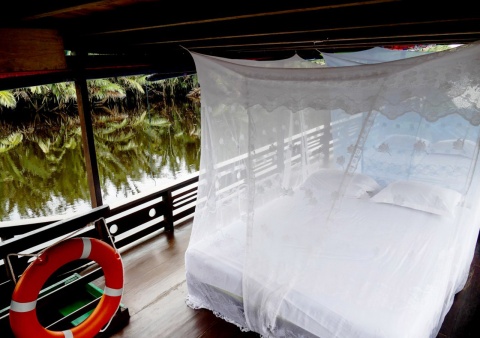
Budget & exchange
When purchasing souvenirs, we ask that our travelers resist the temptation to buy traditional items which are part of local
families/the countries heritage. We also ask our travelers to respect the Species Protection Agreements (CITES) which aims to
protect more than 2,500 species of animals and 30,000 species of threatened plants by prohibiting the trade of hides, ivory,
scales, corals, shells, and the import of live exotic animals.
Tips
Vital equipment
We recommend packing:
For your head:
A rain cape or protective waterproof bag for your day-bag
For your legs:
A good water bottle (min. 1.5 l)
A good sun-cream (SPF 50+, water resistant, biodegradable...)
Helpful equipment
You may also want to bring:
- A camera and spare batteries/portable charger
- A power plug travel adapter
- A head torch and spare batteries
- A pocket knife
- A fast drying micro-fibre beach towel
- A bath towel
- Blister plasters
- A small personal first aid kit
- Zip lock bags to protect your important documents and electronics
- A laundry bag/bin bag for your dirty clothes
- Tissues
- Earplugs
Luggage
Please bring a small rucksack to use as a day bag. You can bring this as hand luggage on the airplane. You will carry your lunch,
water, spare layers and any personal medication with you each day in this bag. You will also need a larger bag to store your other
clothes and belongings in, please ensure that this is a soft bag like a rucksack or holdall rather than a hard cased suitcase because
it is more practical. We recommend packing all of your clothes in plastic bags so that they stay dry in the event of wet weather.
Medicine
Your guide is a trained first-aider and will carry a full first aid kit at all times during the trip. We recommend that you bring a small
personal first aid kit containing any medication you may need such as inhalers, plasters, antiseptic and painkillers.
Passport
To go to Indonesia travelers need a passport which is valid for at least six months after the date of entry. It is your responsibility
to confirm your specific passport requirements and proof of onwards travel is required.
Visa
Visa on Arrival
Travelers applying for visa on arrival must submit:
Mandatory vaccines
For clients who come from Saudi Arabia, you need to be vaccinated against meningitis 10 days before your arrival in
Indonesia.
Health information & recommendations
It is your responsibility to check that your personal insurance covers everything in this trip. A consultation with your doctor is a
prerequisite for any trip. Malaria prophylaxis is advised if your trip goes to Flores, Komodo, Sumatra, Sulawesi, the Sundra Islands
or Kalimatan. Anti-malaria treatments are not necessary in Bali, Java or Lombok. Avoid contact with mosquitoes as much as
possible: apply repellents, wear long trousers/sleeves and sleep with a mosquito net. The World Health Organisation can provide
further details of the latest health news and medical advice.
Weather
Indonesia is positioned on both sides of the equator making it subject to a similar climate year round. As a rule the South is
generally drier and less hot. The average temperature ranges between 24°C and 35°C (75°F and 95°F). We cannot guarantee no
rain but we can suggest that the best season to visit Indonesia is the dry season, from mid-April to October/November.
Electricity
Indonesia uses European-style plugs with two round pins. Voltage is normally 220 V 50 Hz except in a few places where it is 110
V.
Local time
Indonesia is spread across three time zones. The Lesser Sunda Islands use Coordinated Universal Time (UTC)/ Greenwich Mean
Time (GMT) +8. Indonesia does not use Daylight Saving Time (DST).
Sustainable tourism
The Leave No Trace policy can be summarized in 7 simple steps which we hope you will follow during our trip...
We expect all who travel with us to support and uphold our Sustainable Tourism philosophies.


